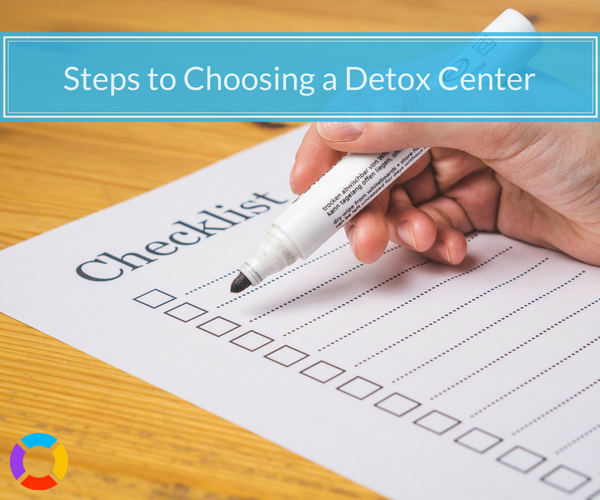How to Choose a Rehab Center + Free Comparison Tools

Why Choosing the Right Rehab Matters
When you have decided to get help, choosing a rehab or addiction treatment center that fits your needs is essential to maintaining a new lifestyle free of substances. The best level of treatment depends on how long you’ve been using the substance, the amount you use, the type of substance, and the severity of your physical dependency.
It is also important to consider any co-occurring conditions, including dual diagnoses with mental health disorders or any physical medical issues. These concurring diagnoses may need to be addressed in conjunction with substance abuse.
Financial consideration should also be evaluated, including whether or not you have insurance coverage.
This resource covers all of these considerations so you can make an informed decision when choosing a rehab center.
For immediate assistance, call the number below, or use the treatment locator to find a detox center near you.
You don’t need to detox alone. Call today for help.
Know What You Need From Treatment
The first step is to explore your options. Using the listings at detox.com can help you find places locally or in any area you choose. Some people like to stay close to home while others prefer the autonomy of being out of the area. It is a good idea to talk to your insurance carrier for recommendations for in-network providers.
The next step in how to choose a rehab facility is speaking with a professional who can assess what level of treatment you need. They will ask you a few questions regarding what kind of substances you use, how long you’ve used them, and the amount of use.
Use this free tool to help you decide what facility is right for you.
Some substances like alcohol and benzodiazepines may require a medically supervised detox because those substances create life-threatening withdrawal. Medication assisted detox is recommended for withdrawal from opioids because it increases the success rate for continued recovery.
It is important to talk to your medical professional regarding ongoing issues that contribute to the detox process. Diabetes, cardiac dysfunction, anemia, cancer and pregnancy can complicate the withdrawal and stabilization process.
Additionally, anyone who has a dual diagnosis of bipolar or schizophrenia, depression, anxiety or any other psychiatric disorder, will need to discuss the detox process with their medical provider. There are addiction treatment centers specifically designed for treating dual diagnoses.
Understand the Types of Rehab and Detox Programs
Most people should plan on participating in a step-down process of treatment. This typically starts with supervised detox and progresses to outpatient levels. Note: The longer a person can remain in a supervised and supportive environment during their recovery process, the higher the statistics for success.
Many types of drug rehabilitation programs offer all these levels of treatment. Following is an overview of this step-down process. This gives insight to the types of drug treatment centers and their various programs.
Note: Not everyone will complete every step on this list. For example, some people may be able to begin their recovery journey at an outpatient level of care, if their symptoms are not as severe and they have a strong support system at home.
Call today and learn which rehab is right for you.
Step 1: Detox
Detoxification and medicated assisted detox are provided in inpatient clinics for an average of three to seven days. It may be medically necessary to stay longer depending on the length of use, amount and type of substance used, and your overall health.
It is often medically necessary to be supervised if detoxing off alcohol, benzodiazepines and/or barbiturates. These substances can cause life-threatening seizures and irregular heart fluctuations. Dehydration is also a concern when detoxing, due to flu-like withdrawal symptoms.
In some cases, individuals may be able to participate in outpatient detox programs. However, it is important to discuss your situation with your treatment providers to determine if this is a safe, suitable option.
Step 2: Inpatient Treatment
Inpatient or residential treatment may last 25 to 45 days. These types of drug treatment centers provide 24/7 supervision and care. Participants receive therapy that usually occurs in both individual and group settings.
Step 3: Partial Hospitalization Program
A partial hospitalization program (PHP) provides four to six hours of programming a day. Programming often includes group, peer and individual sessions. Participants typically attend sessions at the rehab facility for much of the day, while living at home.
Step 4: Intensive Outpatient Program
An intensive outpatient program (IOP) usually lasts for nine to 12 weeks. It usually meets three times a week for three hours at a time, for a total of nine to 12 hours a week. Programming also includes group, peer and individual sessions.
Step 5: Sober Living
Sober living housing may last up to two years. These sober communities are available across the country for long-term lifestyle support. Many people choose to live in sober housing while continuing in outpatient maintenance treatment. This allows individuals to transition back into a work/life balance.
Step 6: Outpatient Treatment
Outpatient therapy is a maintenance program beginning with multiple weekly sessions and dropping to once or twice a month. These programs can be both group and individual.
Step 7: Aftercare
Aftercare options for continued recovery include peer support programs that are often free and meet weekly to build a new community in sobriety.
Additional services may be available throughout the step-down treatment process such as family and marriage counseling, art therapy, equine therapy, meditation, yoga, and other types of expressive treatments.
Telehealth options may be available for outpatient and peer support programming. Telehealth can provide options for group and individual sessions.
Call now and see if telehealth options are right for you.
Decide on the Right Location
Consider what amenities will meet your needs for developing a new lifestyle substance free. Treatment facilities are located in urban environments, farm land, country ranches, beaches, and isolated in the mountains or deserts.
When you are trying to find a rehab facility, consider the following questions:
Do I want to go to a large treatment center or do I want to be in a small, private house where there are only five to eight people at a time?
- Some treatment centers have over 50 beds and are attended by people at all different levels of recovery.
Do I want gender specific treatment (men or women only)? Or is co-ed going to work for me?
- There are treatment centers specifically designed for women with children so women can bring their kids with them.
- Male-only centers and women-only centers are recommended for anyone struggling with sex addiction, codependency and love addiction.
Am I going to continue working while in treatment?
- If so, then finding a place close to home that offers flexible sessions may be helpful. Telehealth can also be helpful when a person continues to work and live at home.
Do I want to separate myself from the environment where I have been using? Or do I want rehab and detox centers near me?
- If you want to get away, then you may want to consider a serene treatment center in the country and out of the area.
- Some people prefer the autonomy of being in a treatment center where they will not be recognized or see people they know from their home community.
What type of amenities do I want to participate in?
- There are many options for personal training, equine therapy, nutritional counseling, or even surfing therapy if you are close to a beach.
Use this free downloadable tool to compare facilities and help you find the care you need!
Evaluate Quality and Credibility
Addiction treatment centers that accept insurance payments will be accredited by either the Commission on Accreditation of Rehabilitation Facilities (CARF) or the Joint Commission who certifies hospitals and medical healthcare facilities.
Facilities that provide buprenorphine/naloxone (Suboxone) for opioid detox will also be given a tracking number by the Drug Enforcement Administration (DEA). Both the medical provider as well as the facility will have a DEA number.
Even if you are paying cash for treatment, it is still important to seek a facility with either of these certifications. The process of getting accredited is arduous and demonstrates professionalism and standardization of protocols.
The best rehab centers in the US have these certifications. Some popular rehab centers may not, so be sure to confirm rather than assume they are credible just because they are well-attended.
Additionally, licensure of providers is important. There should be a clinical director who is supervising other therapists and a medical director who supervises medical staff in any detox facility.
These professionals carry licensure by the state they practice in, and the status of licenses can be checked online through the state licensing board. Therapists, behavioral health technicians, nurses, doctors and all other personnel will have a chain of command with a complaint process clearly displayed in a public area.
A patient/client manual should be available upon check in. This manual will provide clear instructions as to policies and procedures that apply to you while in treatment.
If you have any questions about this manual, or if one is not provided for you upon check in, ask the admissions staff for instructions.
A patient/client manual is sometimes electronic and may be sent to you prior to your arrival detailing what to bring with you, what the expectations for participation are, and how your progress will be evaluated.
Match your Preferences and Lifestyle
Addiction treatment centers provide a variety of amenities and specialized treatment services. Some facilities offer treatment targeted for specific populations.
To match your preferences to good rehab facilities, consider searching for the following specialized programs:
- LBGTQ+
- Veterans
- Men
- Women
- Teens/Adolescents
- Moms with children
- Faith-based
- Holistic
- Co-occurring eating disorders
- Psychiatric diagnoses
Wondering how to find a good rehab facility that offers these specialty programs? A great tool to use is this rehab locator.
Review Payment and Insurance Options
Admission staff are trained to verify if the facility is in-network for your insurance company to determine insurance coverage. If they are out of network, they can tell you what you can expect to pay.
The admission staff are able to give you prices for treatment, estimate length of stay and level of care. If you do not have insurance coverage, they can inform you of other payment options they accept. This may include scholarships, grants, or government funding.
Many facilities also offer discounts based on your ability to pay, called sliding-scale fees. In some cases, the cost of detox or other treatments may even be free.
Ask the Right Questions Before Committing
Following are key questions to ask a rehab facility when discussing potential admission:
- What will it cost?
- What should I bring?
- Who are your medical and clinical directors?
- What kind of amenities are there?
- Will I have a private room or am I sharing it with a roommate?
- How many people are there in a room?
- Will I be able to use my phone and laptop?
- Can I still work from there or is that prohibited?
- Is this a co-ed facility or gender specific?
- What is the detox procedure for my specific addiction?
- What are the therapy options available?
- Do you offer experiential therapy programs?
- Can I call my spouse, children, parents, and how often?
- Is there a smoking area or is this a non-smoking facility?
Admission Process and What to Expect
How do you get into rehab? The admission process is fairly easy.
First you will call the facility and talk with an admission specialist. They will collect basic information and verify insurance coverage or other payment options.
They will then consult with the clinical staff regarding level of treatment and see if there is available bed space. You will receive a call back, usually that same day.
It is a good idea to speak with multiple treatment facilities in the event one has space and another does not. Depending on the urgency of your medical condition, finding immediate admission may be necessary.
Browse rehab and detox listings by state or city to get started.
Note: If you are looking into admission to rehab for a loved one, this may require an intervention to convince them to get help. For assistance with this process follow these steps to a successful intervention.
Start Your Recovery Journey
As you start your recovery journey, doing research to learn more about addiction treatment programs is an essential first step.
If you are seeking information for a loved one or friend, presenting them with options is a valuable way to ensure they are making the decision and are not feeling forced into treatment. People can only change when they are ready.
The more information you have for yourself or a loved one, the greater the commitment to a decision can be.
Not sure what care is right for you? Use this free downloadable tool to make the choice easier!



